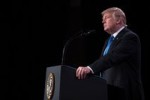Neither Trumpism Nor Bidenomics Has an Answer to Inflation
Advertisement
Supported by
Ross Douthat
By Ross Douthat
Opinion Columnist
The flare of inflation reported this week, the unwelcome guest still hanging around when everyone was hoping he’d been shown the door, is a useful reminder of one way to understand the Biden era’s frustrations. The administration’s defenders often argue that it has been more successful at legislating and policymaking than it’s given credit for, and there’s some truth to that contention. The trouble is that the White House has mostly been successful at implementing an economic agenda addressed to the discontents of the mid-2010s — even as the problems of the 2020s, inflation above all, have made those issues less relevant to voters’ immediate concerns.
Think of the 2010s as the era of reasonable disillusionment with neoliberalism. The right’s populism and the left’s socialism were hardly models of rigor and consistency, but behind both Donald Trump’s ascent and Bernie Sanders’s popularity lay an array of concerns about problems the existing elite consensus didn’t seem well equipped to deal with — the downsides of free trade and China-America intertwinement, the painfully slow recovery from the Great Recession, the rising costs of health care and education.
Much of the Biden administration’s economic agenda has been designed with this constellation of issues in mind. The full-employment stimulus, the big infrastructure spending deal, the experiments with industrial policy, the........
© The New York Times





















 Toi Staff
Toi Staff Gideon Levy
Gideon Levy Andrew Mitrovica
Andrew Mitrovica David Hutt
David Hutt Neve Gordon
Neve Gordon Patrick Gathara
Patrick Gathara Moncef Khane
Moncef Khane Ron Kronish
Ron Kronish Dr Ramzy Baroud
Dr Ramzy Baroud Rami G Khouri
Rami G Khouri Brahma Chellaney
Brahma Chellaney Tarik Cyril Amar
Tarik Cyril Amar Ghada Ageel
Ghada Ageel Steve Wenick
Steve Wenick Brad Glosserman
Brad Glosserman Fernando Romero Nuñez
Fernando Romero Nuñez
